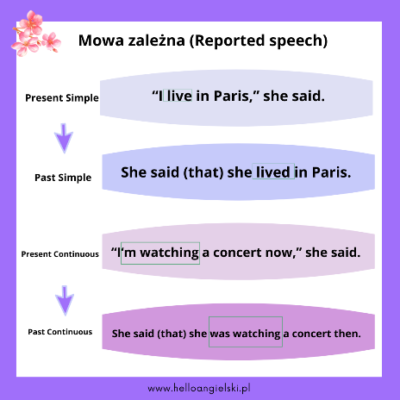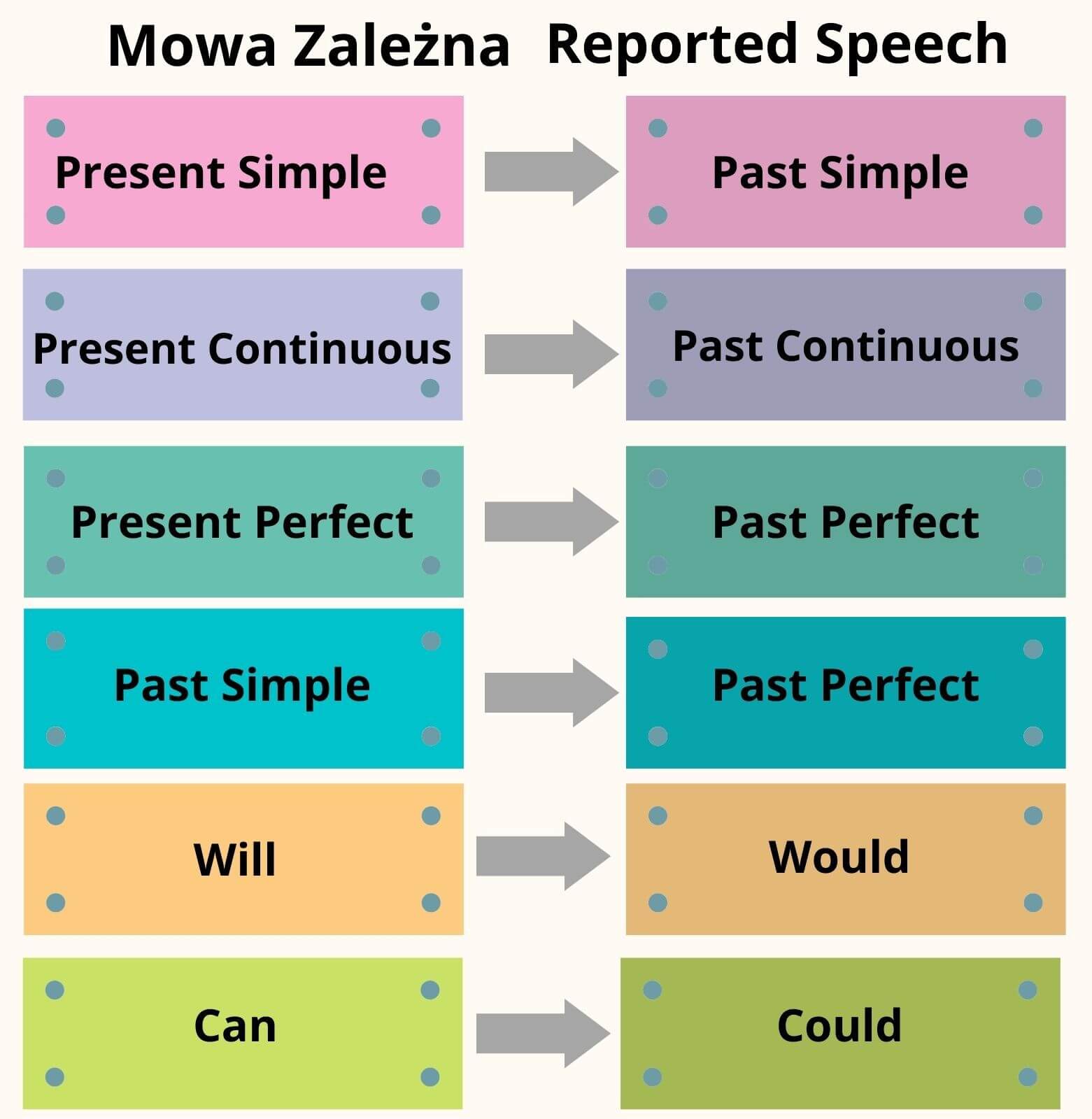Mowa zależna w angielskim – reported speech
Mowa zależna – zastosowanie
 Mowy zależnej używamy, gdy przekazujemy komuś treść wypowiedzi innej osoby, nie cytując dokładnie tej wypowiedzi. Zdanie oznajmujące w mowie zależnej zaczyna się często takimi słowami jak: say, tell, ask bez cudzysłowu.
Mowy zależnej używamy, gdy przekazujemy komuś treść wypowiedzi innej osoby, nie cytując dokładnie tej wypowiedzi. Zdanie oznajmujące w mowie zależnej zaczyna się często takimi słowami jak: say, tell, ask bez cudzysłowu.
Przykład:
Mowa niezależna: “I do my homework every day”, she said. “Codziennie odrabiam pracę domową”, powiedziała.
Mowa zależna: She said she did her homework every day. Powiedziała, że codziennie odrabia pracę domową.
Mowa zależna budowa zdań, następstwo czasów
Zamieniając wypowiedzi w mowie zależnej, należy zwrócić uwagę, jaki czas występuje w zdaniu nadrzędnym. Jeżeli w zdaniu nadrzędnym występuje w czasie teraźniejszym lub przyszłym (np. Present Simple, Future Simple, Present Perfect), nie powoduje to zamiany czasu w zdaniu podrzędnym.
Kate: I will help you. Kate: Pomogę ci.
Kate says (that) she will help you. Kate mówi, że ci pomoże.
Czasownik wprowadzający: says jest w czasie teraźniejszym Present Simple, co nie powoduje następstwa czasów.
Jeżeli w zdaniu nadrzędnym występuje czas przeszły (np. Past Simple, Past Perfect), powoduje to zamianę czasu w zdaniu podrzędnym. W wypowiedzi przekazywanej za pomocą mowy zależnej zmieniają się wtedy czasy gramatyczne, według poniższych zasad:
Present Simple → Past Simple
am/is → was, are → were, do/does → did, have/has → had
| Present Simple | → | Past Simple |
| “I live in Paris,” she said. | → | She said (that) she lived in Paris. |
| “We want to go on holiday,” they said. | → | They said (that) they wanted to go on holiday. |
| “She is hungry,” he said. | → | He said (that) she was hungry. |
Present Continuous → Past Continuous
am/is/are doing → was/were doing
| Present Continuous | → | Past Continuous |
| “I‘m watching a concert now,” she said. | → | She said (that) she was watching a concert then. |
| Lucy: I’m learning English. | → | Lucy said (that) she was learning English. |
| “We are leaving tomorrow,” he told her. | → | He told her (that) they were leaving the next day. |
Present Perfect → Past Perfect
have/has done → had done
| Present Perfect | → | Past Perfect |
| “I have lived here all my life,” my neighbour told me. | → | My neighbour told me (that) he had lived there all his life. |
| “We have just eaten lunch.” | → | They admitted (that) they had just eaten lunch. |
| “Linda has found the key,” said Mary. | → | Mary said (that) Linda had found the key. |
Past Simple → Past Perfect
did → had done
| Past Simple | → | Past Perfect |
| “We met Mark in London,” said Bill. | → | Bill said (that) they had met Mark in London. |
| “I went to work by car yesterday.” | → | She said (that) she had gone to work by car the day before. |
| “I didn’t take your book,” he answered. | → | He answered (that) he hadn’t taken my book. |
Future Simple → Would + bezokolicznik
will do → would do
| Future Simple | → | Would + bezokolicznik |
| “I will wait for you tomorrow,” he promised. | → | He promised (that) he would wait for me the next day. |
| “John will give you a ring soon,” she explained. | → | She explained (that) John would give me a ring soon. |
| “We will visit you this afternoon.” | → | He told me (that) they would visit me that afternoon. |
Can → Could
| Can | → | Could |
| “Eve can feed the dog,” he said. | → | He said (that) Eve could feed the dog. |
| “I can’t tell you about it,” Mandy replied. | → | Mandy replied (that) she couldn’t tell me about it. |
| “I can cook dinner,” she said. | → | She said (that) she could cook dinner. |
Must (wyrażenie obowiązku) → Had to
| Must (obligation) | → | Had to |
| “We must finish the project today,” she said. | → | She said (that) we had to finish the project that day. |
| “They must leave on Saturday,” he insisted. | → | He insisted (that) they had to leave on Saturday. |
| “She must tidy her room now,” he said. | → | He said (that) she had to tidy her room at that time. |
Past Continuous → Past Perfect Continuous
was/were doing → had been doing
“I was swimming,” Brenda explained. Brenda explained (that) she had been swimming.
Present Perfect Continuous → Past Perfect Continuous
have/has been doing → had been doing
“Brian has been working very hard,” they announced. They announced (that) Brian had been working very hard.
May → Might
“I may be early,” he warned us. He warned us (that) he might be early.
I tryb warunkowy → II tryb warunkowy
“If I meet Susan, I will talk to her,” said Mike.
Mike said if he met Susan, he would talk to her.
W mowie zależnej nie zmieniamy czasu, mimo że w zdaniu nadrzędnym występuje czas przeszły, jeżeli mówimy o prawach natury, zasadach, regułach lub gdy w zdaniu podrzędnym występuje czas Past Perfect, Past Perfect Continuous, II i III tryb warunkowy.
Jeżeli w kontekście zdania słowo must nie wyraża obowiązku, a jedynie możliwość lub wnioskowanie, również nie następuje zamiana czasu.
Mowa niezależna: “The sun rises in the East,” the teacher said. “Słońce wschodzi na wschodzie” – powiedział nauczyciel.
Mowa zależna: The teacher said (that) the sun rises in the East. Nauczyciel powiedział, że słońce wschodzi na wschodzie.
Ponieważ przytoczone jest to prawo natury i prawda ogólna, nie nastąpiła zamiana czasów.
Mowa zależna – słowa rozpoczynające zdanie oznajmujące
W zdaniu nadrzędnym, oprócz słów, takich jak say – powiedzieć, tell – powiedzieć, ask – zapytać, prosić, występują również słowa: explain – wyjaśnić, answer – odpowiedzieć, reply – odpowiedzieć, repeat – powtórzyć, promise – obiecać, add – dodać, admit – przyznać, complain – narzekać, deny – zaprzeczać, point out – zauważyć, remark – zwrócić uwagę, zauważyć, report – zgłaszać, whisper – szeptać, insist – nalegać, domagać się, announce – ogłosić, warn – ostrzegać, claim – twierdzić, remind – przypominać.
Mowa zależna – zmiany określników i zaimków
W mowie zależnej, zmianie mogą ulec określenia, takie jak:
now → then/ at that time

today → that day
tomorrow → the next day/ the following day
yesterday → the previous day/ the day before
tonight → that night
last week → the previous week/the week before
next week → the following week/ the week after
two days ago → two days earlier
this → that
these → those
here → there
ago → before
Mowa zależna – pytania zależne
 Tworząc pytanie zależne, poza zamianą czasów (według zasad opisanych powyżej), należy również pamiętać o zamianie szyku pytającego na twierdzący.
Tworząc pytanie zależne, poza zamianą czasów (według zasad opisanych powyżej), należy również pamiętać o zamianie szyku pytającego na twierdzący.
Do pytań ogólnych wprowadzamy spójnik If (czy) lub whether (czy) i zamieniamy szyk zdania na oznajmujący.
Pytanie ogólne: Is there any milk left? Czy zostało jeszcze trochę mleka?
Pytanie zależne: She asked me if there was any milk left. Zapytała mnie, czy zostało jeszcze trochę mleka.
Pytanie ogólne: Do you cook at home? Czy gotujesz w domu?
Pytanie zależne: He asked me if I cooked at home. Zapytał mnie, czy gotuję w domu.
Pytanie ogólne: Have you done your homework? Czy odrobiłeś pracę domową?
Pytanie zależne: The teacher asked whether we had done our homework. Nauczyciel zapytał, czy odrobiliśmy pracę domową.
Pytanie ogólne: “Did he tell you about the meeting” she asked me. “Czy powiedział ci o spotkaniu” – zapytała mnie.
Pytanie zależne: She wondered whether he had told you about the meeting. Zastanawiała się, czy powiedział ci o spotkaniu.
Pytanie ogólne: “Will you take the dog for a walk?” he asked me. “Weźmiesz psa na spacer?” zapytał mnie.
Pytanie zależne: He asked me if I would take the dog for a walk. Zapytał mnie, czy wyprowadziłabym psa na spacer.
W pytaniach szczegółowych, zaczynających się od wyrazów pytających takich jak: when – kiedy, what – co, where – gdzie, who – kto, how – jak, why – dlaczego, what time – o której godzinie, pytanie zależne zaczynamy tym samym słowem.
Pytanie ogólne: What’s your favourite film?
Pytanie zależne: He asked her what her favourite film was.
Pytanie ogólne: Where are you going, Mary?
Pytanie zależne: They asked Mary where she was going.
Pytanie ogólne: How long have you known Mark?
Pytanie zależne: She asked me how long I had known Mark.
Pytanie ogólne: What time did you arrive?
Pytanie zależne: He asked me what time I had arrived.
Pytanie ogólne: When does the concert start?
Pytanie zależne: We wanted to know when the concert started.
Pytanie ogólne: “How much money have you got?” he asked me.
Pytanie zależne: He asked me how much money I had.
W zdaniu nadrzędnym, oprócz czasownika ask – pytać, można stosować również czasowniki, takie jak: want to know – chcieć wiedzieć, wonder- zastanawiać się, find out – dowiedzieć się.
Mowa zależna: polecenia, rozkazy i prośby
Gdy cytujemy polecenia, rozkazy, nakazy lub prośby używamy czasownika takiego jak ask, tell, order, advise, warn, command, odpowiedniego zaimka osobowego oraz konstrukcji to (not to) + bezokolicznik.
“Go away!” She told me to go away.
“Do it now!” He told us to do it then.
“Don’t talk to me!” He told us not to talk to him.
“Don’t miss the bus again!” She told me not to miss the bus again.
“Please open the window.” She asked me to open the window.
“Stop laughing! “He told us to stop laughing.
“Leave me alone, John.” She asked John to leave her alone.
“Will you be quiet, please?” The teacher asked me to be quiet.
“Could you pass me the salt?” He asked me to pass him the salt.
“You shouldn’t eat so much chocolate.” She advised me not to eat so much chocolate.
Mowa zależna – ćwiczenia
Pytania zależne. Zdania pytające w mowie zależnej. Ćwiczenie 1. Wybierz poprawną formę czasownika.
Polecenia, rozkazy i prośby w mowie zależnej Ćwiczenie 1. Wybierz formę czasownika.
Polecenia, rozkazy i prośby w mowie zależnej Ćwiczenie 2. Wybierz formę czasownika.

